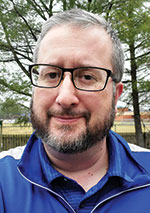Sight Unseen / Brandon A. Evans
The wide space between two words
 The best stories are those where the end of everything meets the beginning of something greater.
The best stories are those where the end of everything meets the beginning of something greater.
They’re the stories that catch us, that draw us in—the ones that let us play safely at the edge of despair because we know it’s all going to work out somehow. We let ourselves take in the sadness because it’s precisely the sadness that will make the triumph that much sweeter.
Even more wonderful, though, is that such surprises aren’t just for stories: they’re part and parcel of the template set into the universe by God; things found not only on the pages of Hollywood scripts, but also on the pages of history, and even more, on the pages of Scripture itself.
The whole of salvation—from Adam and Eve to the lives of the saints—is filled, positively filled, with the strange idea that evil’s ultimate undoing is always hidden right in its moment of victory.
Stranger yet is that God’s answer to the problem of evil is precisely that he allows it to bring light into the world—and not merely light, but a greater light than would have shone without it.
Think of how many stories the Bible alone has told us that both end and begin at the turning of the same two words: “And yet.”
Abraham, a man born of the scattered and frayed human race, should have killed his son at the altar in Moriah. He should have lost the only thing that mattered to him and died believing in a bloodthirsty God, and yet his hand was stayed, an ancestral line was opened, and a covenant forged.
Many years later, the Israelites, trapped and hopeless along the border of a sea with the Egyptian army bearing down, should have had their long and lustrous story wiped away in an afternoon, and yet God made an impossible road for them, a way where there was no way, bridging the path to countless new tomorrows.
And finally, at salvation’s dawn,
St. Joseph should have divorced his pregnant wife, his own story drowned in the sadness of a betrayal that could have no other explanation or happy ending, and yet he became the sole protector of the two most important people in the history of history, their lives only saved because of his fatherly care.
How and why did all these things happen? What did God require from Abraham, from Moses, from Joseph, to work such wonders? It was not, in the end, a mountainous sacrifice, or a bloody battle, or a great and terrible deed. What saved the world thrice over when all the chips were down was not power or might or wealth or wisdom, but willingness.
Surrender.
Trust.
He asked for the kind of faith that fits in a mustard seed.
It seems too simple for us: Despite those true stories and the lives of countless saints, we still think that God could never do that sort of thing in our messy lives. We deceive ourselves into thinking up great sacrifices and then never making them.
But God’s ways are not our ways. He does not require a fantastic amount of room and time and material to work wonders. He is calling each of us, over and again, to make the sacrifice of faith that he truly wants.
His eye is fixed on the little things, really—the things we hold close, that we keep to ourselves—those privations which we lock away and cling to for support instead of him.
Those little safeties, those little emotions, those little controls.
We all know what they are, and which ones are ours. It does not matter whether they manifest in sins great or small: at the heart of every sickness in us is a little refusal: a point at which we want—we demand—that our will be done.
And as long as we hold on to our will, we cannot be surprised by his. So God bids us gently—very gently—to the simple act of letting go. Not of everything, not all at once, but a start—taking even just one of those little seeds of pride in our hearts and holding them up to him like a grain of sand in our palm.
To give up such things—a joy taken too liberally, a bit of gossip, an expectation of reward, a harsh word—requires honesty and faith…but most of all love.
And God does not waste love.
The surrender of our little treasures reveals that life is not so much what we are holding back from God, but rather, what impossible things he is waiting to do with them—what strange and utterly unforeseen twists he is poised to spring into our lives with the same words he used in all those other great stories of loss turned to gain.
For the whole world—or much more of it than we dare suspect—lives within the wide and wild space of those two words:
“And yet.”
(Sight Unseen is an occasional column that explores God and the world. Brandon A. Evans is the online editor and graphic designer of The Criterion and a member of St. Susanna Parish in Plainfield.) †
 The best stories are those where the end of everything meets the beginning of something greater.
The best stories are those where the end of everything meets the beginning of something greater.